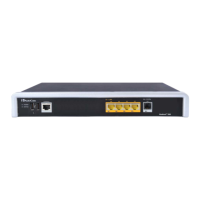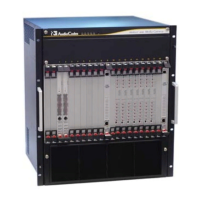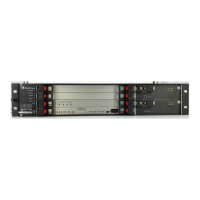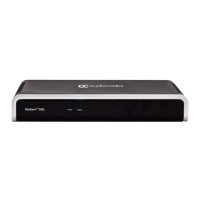Version 6.6 107 Mediant 2000
User's Manual 11. Network
The Multiple Interface Table page allows you to configure these network interfaces. Each
row of the table defines a logical IP interface with the following attributes:
Application type allowed on the interface:
• Control - call control signaling traffic (i.e., SIP)
• Media - RTP traffic
• Operations, Administration, Maintenance and Provisioning (OAMP) -
management (such as Web- and SNMP-based management)
IP address and subnet mask represented by prefix length
VLAN ID (if VLANs are enabled)
Default Gateway - traffic from this interface destined to a subnet that does not meet
any of the routing rules, local or static routes, are forwarded to this gateway (as long
this application type is allowed on this interface.
Primary and secondary DNS IP address (optional)
You can configure up to 16 interfaces, consisting of up to 15 Control and Media interfaces
and 1 OAMP interface.
This page also provides VLAN-related parameters for enabling VLANs and defining the
Native VLAN ID. This is the VLAN ID to which incoming, untagged packets are assigned.
You can also configure Quality of Service (QoS) by assigning VLAN priorities and
Differentiated Services (DiffServ) for the supported Class of Service (CoS). For configuring
Quality of Service (QoS), see 'Configuring the QoS Settings' on page 118.
Complementing the Multiple Interface table is the IP Routing table, which allows you to
define static routing rules for non-local hosts/subnets. For more information, see
'Configuring the IP Routing Table' on page 115.
Notes:
• When adding more than one interface, ensure that you enable VLANs using the
'VLAN Mode' (VlANMode) parameter.
• When booting using BootP/DHCP protocols, an IP address is obtained from the
server. This address is used as the OAMP address for this session, overriding the
IP address configured in the Multiple Interface table. The address specified in this
table takes effect only after you save the configuration to the device's flash
memory. This enables the device to use a temporary IP address for initial
management and configuration, while retaining the address configured in this
table for deployment.
• To configure firewall rules (access list) for allowing or blocking packets received
from specific IP network interfaces, see 'Configuring Firewall Settings' on page
133.
• The Multiple Interface table can also be configured using the table ini file
parameter, InterfaceTable (see 'Networking Parameters' on page 503).
